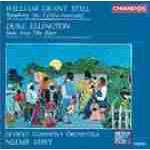
The River / Symphony No 1, 'Afro-American'
 $40.00
Out of Stock
$40.00
Out of Stock6+ weeks add to cart
DUKE ELLINGTON / W.G. STILL
The River / Symphony No 1, 'Afro-American'
Detroit Symphony Orchestra / Neeme Jarvi
[ Chandos Classics / CD ]
Release Date: Monday 10 May 2004
This item is currently out of stock. It may take 6 or more weeks to obtain from when you place your order as this is a specialist product.
"This is an imaginative coupling of two major figures in black American music. A modern recording of the Still is a real discovery which ought to bring this first Afro-American symphony to a wide audience."(Gramophone)
"This is an imaginative coupling of two major figures in black American music. A modern recording of the Still is a real discovery which ought to bring this first Afro-American symphony to a wide audience. The style is accessible, the scoring sophisticated and colourful and, although there are blue notes and syncopated rhythms, the work is not under the shadow of Gershwin even though the symphony's construction is similarly episodic rather than developmental. Each of the four movements is related to fragments of poetry by Paul Laurence Dunbar, quoted in the score, and the whole work is inscribed by the composer "with humble thanks to God, the source of inspiration".
The orchestra is a large one, with a prominent part, right at the start of the first movement, for cor anglais and later on bass clarinet. The slow movement, which comes second, evokes Mahler with added blue notes, although the harp in places supports impressionist harmony, used more like Delius than Debussy. The snappy scherzo, a kind of hallelujah, even has a part for tenor banjo and the finale is introduced by a slow spiritual with characteristic dignity. A bassoon solo in the middle gets lost in an otherwise faithfully balanced recording. The ending is nobly cast, reflecting Afro-American idealism of the 1920s. Altogether there is no reason why this symphony should not become as popular as Gershwin's concert works. (More recordings, and books about Still can be obtained from William Grant Still Music, 22 S. San Francisco St., Suite 422, Flagstaff, Arizona 86001-5737.)
Ellington wrote his ballet score, The River, for American Ballet Theatre m 1970 long after his prime, as many would say. Ron Collier's orchestration is mostly Hollywood with occasional glimpses of better things which suggest the arrangements of Nelson Riddle. But fragments of the Duke survive, which is surely justification enough."
- Peter Dickinson
(Gramophone)
Tracks:
William Grant Still
Symphony No. 1 'Afro-American' 24:10
Symphonie Nr. 1 (Afro-amerikanische)
Duke Ellington
Suite from 'The River', orchestrated Collier 26:50